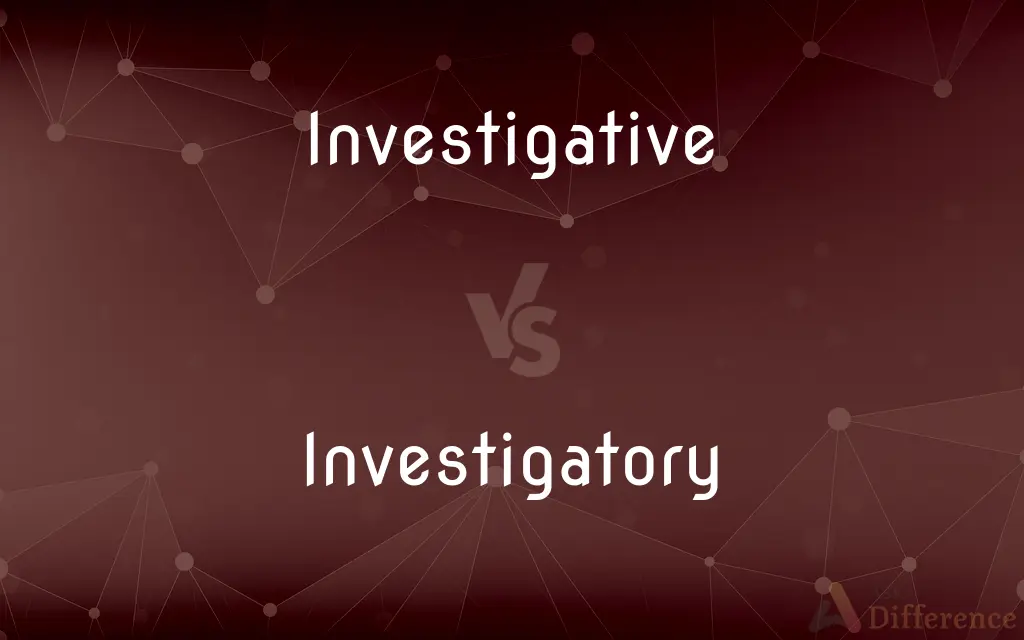Investigative vs. Investigatory — What's the Difference?
Edited by Tayyaba Rehman — By Fiza Rafique — Updated on March 24, 2024
Investigative work aims to uncover facts or information, often associated with journalism. Investigatory refers to formal inquiries or systematic examinations, typically within official contexts.

Difference Between Investigative and Investigatory
Table of Contents
ADVERTISEMENT
Key Differences
Investigative work is primarily associated with journalism and detective work, where the goal is to uncover facts, gather information, and present findings, often to inform the public or solve crimes. It involves critical thinking, thorough research, and sometimes covert operations to reveal the truth. Whereas, investigatory activities are more formally structured and are often carried out by official bodies or institutions, such as government agencies, to conduct systematic examinations or inquiries into specific matters, events, or allegations.
While investigative efforts are characterized by active pursuit of information, using various methods such as interviews, observations, and analysis of documents, investigatory processes are typically more procedural, involving formal steps, guidelines, and often legal frameworks to guide the investigation. On the other hand, investigatory work might include public hearings, audits, and formal investigations following a predefined protocol.
Investigative work often seeks to expose wrongdoing, uncover hidden information, or solve mysteries, driven by curiosity, a sense of justice, or the need for public awareness. It can lead to groundbreaking stories or solve complex cases. In contrast, investigatory efforts are usually initiated in response to specific complaints, allegations, or as part of regulatory compliance, focusing on gathering evidence, verifying facts, and determining compliance or misconduct.
The outcome of investigative work can vary, leading to public exposure of issues, criminal investigations, or policy changes. It often ends with the publication of findings or the presentation of evidence to authorities. Conversely, investigatory findings are usually formalized in reports, recommendations, or legal proceedings, aimed at resolving the matter at hand or enforcing laws.
While both investigative and investigatory work aim to uncover the truth, the context, methodology, and implications of their findings can differ significantly. Investigative work is often seen as more dynamic and broad, targeting a wide audience, while investigatory work is formal, detailed, and focused on specific objectives within legal or organizational frameworks.
ADVERTISEMENT
Comparison Chart
Primary Context
Journalism, detective work.
Official inquiries, formal examinations.
Focus
Uncovering facts, information.
Systematic examinations, specific matters.
Methods
Interviews, observations, document analysis
Formal steps, legal frameworks.
Goals
Expose wrongdoing, inform public.
Verify facts, determine compliance.
Outcomes
Public exposure, criminal investigations.
Reports, recommendations, legal proceedings.
Audience
General public, wide audience.
Regulatory bodies, legal entities.
Nature
Dynamic, broad.
Formal, procedural.
Associated with
Journalists, detectives.
Government agencies, official bodies.
Compare with Definitions
Investigative
Involving detailed examination to uncover facts.
The investigative journalist spent months researching the story.
Investigatory
Results are typically formalized in reports or legal proceedings.
The investigatory findings led to several recommendations for reform.
Investigative
Seeking to expose wrongdoing or inform the public.
Investigative reporting can often initiate policy changes.
Investigatory
Focused on verifying facts or determining compliance.
The investigatory work confirmed violations of the law.
Investigative
Characterized by active pursuit of information.
The detective’s investigative skills were crucial in solving the case.
Investigatory
Involves procedural steps within a legal or formal framework.
Their investigatory process included interviews and document analysis.
Investigative
Aimed at solving mysteries or revealing truths.
Their investigative work led to uncovering a major scandal.
Investigatory
Often initiated by official bodies in response to complaints.
The agency’s investigatory powers are used to enforce regulations.
Investigative
Involves critical thinking and thorough research.
The team conducted an investigative study to understand the outbreak’s origins.
Investigatory
Pertaining to formal inquiry or systematic examination.
The investigatory committee was set up to review the allegations.
Investigative
Of or concerned with investigating something
A special investigative committee to look into the strikers' demands
Investigatory
To observe or inquire into in detail; examine systematically
Investigate a crime.
Investigate ways to use less energy.
Investigate whether the virus is contagious.
Investigative
Of or relating to investigation
Investigative methods.
Investigatory
To make a detailed inquiry or systematic examination.
Investigative
Characterized by or engaged in investigation; specializing in uncovering and reporting hidden information
Investigative journalism.
Investigatory
Aimed at investigating; investigative.
Investigative
Of or pertaining to investigation
Investigatory
Of or pertaining to an investigation; accomplished by investigation; designed to find information or ascertain facts; as, investigatory committee; the investigatory excesses of the prosecutor.
Investigative
Inquisitive; curious
Investigatory
Designed to find information or ascertain facts;
A fact-finding committee
Investigative reporting
Investigative
Given to investigation; inquisitive; curious; searching.
Investigative
Designed to find information or ascertain facts;
A fact-finding committee
Investigative reporting
Common Curiosities
How do the methods of investigative and investigatory work differ?
Investigative methods are broad and can include covert operations, while investigatory methods are more structured and adhere to legal and procedural frameworks.
How do the outcomes of investigative and investigatory work differ?
Investigative work often results in public exposure or journalistic reports, whereas investigatory work typically concludes with formal reports, legal actions, or policy recommendations.
Are investigative journalists part of investigatory bodies?
No, investigative journalists work independently of official investigatory bodies, though their findings can influence or trigger formal investigations.
Can an individual be involved in both investigative and investigatory work?
While rare, it's possible for individuals, especially those in certain professions like law enforcement, to engage in both types of work, depending on their role and the context of their investigations.
What challenges do investigative journalists face?
They often face legal challenges, threats to personal safety, and the challenge of accessing tightly held information.
Can investigatory findings be made public?
Yes, depending on the nature of the investigation and legal considerations, investigatory findings can be made public, often through reports or during hearings.
What is the main difference between investigative and investigatory work?
Investigative work is often journalistic or detective-oriented, focusing on uncovering facts for a broad audience, while investigatory work is formal and procedural, aimed at examining specific matters within official contexts.
Can investigative work lead to investigatory actions?
Yes, investigative findings can sometimes prompt official investigatory actions or inquiries.
Is one more important than the other?
Both are crucial in their contexts; investigative work is vital for public awareness and justice, while investigatory work is essential for formal accountability and legal compliance.
What drives someone to pursue investigative work?
A desire to uncover the truth, expose wrongdoing, and inform the public often motivates those in investigative roles.
Who typically conducts investigatory work?
Government agencies, regulatory bodies, and official commissions are common examples of entities that conduct investigatory work.
How are investigative and investigatory efforts funded?
Investigative efforts may be funded by media organizations or grants, while investigatory efforts are typically funded by governmental or institutional budgets.
How does technology impact investigative and investigatory work?
Technology facilitates more sophisticated methods for both types of work, including digital forensics, online research, and the use of databases for tracking and analysis.
What impact does investigatory work have on policy?
It can lead to policy changes, regulatory reforms, and the implementation of new guidelines or laws.
What legal protections exist for investigative workers?
Journalists and investigators may be protected by laws that safeguard freedom of the press and whistleblower protections, depending on the jurisdiction.
Share Your Discovery

Previous Comparison
Alack vs. Alas
Next Comparison
Humanness vs. HumanityAuthor Spotlight
Written by
Fiza RafiqueFiza Rafique is a skilled content writer at AskDifference.com, where she meticulously refines and enhances written pieces. Drawing from her vast editorial expertise, Fiza ensures clarity, accuracy, and precision in every article. Passionate about language, she continually seeks to elevate the quality of content for readers worldwide.
Edited by
Tayyaba RehmanTayyaba Rehman is a distinguished writer, currently serving as a primary contributor to askdifference.com. As a researcher in semantics and etymology, Tayyaba's passion for the complexity of languages and their distinctions has found a perfect home on the platform. Tayyaba delves into the intricacies of language, distinguishing between commonly confused words and phrases, thereby providing clarity for readers worldwide.














































